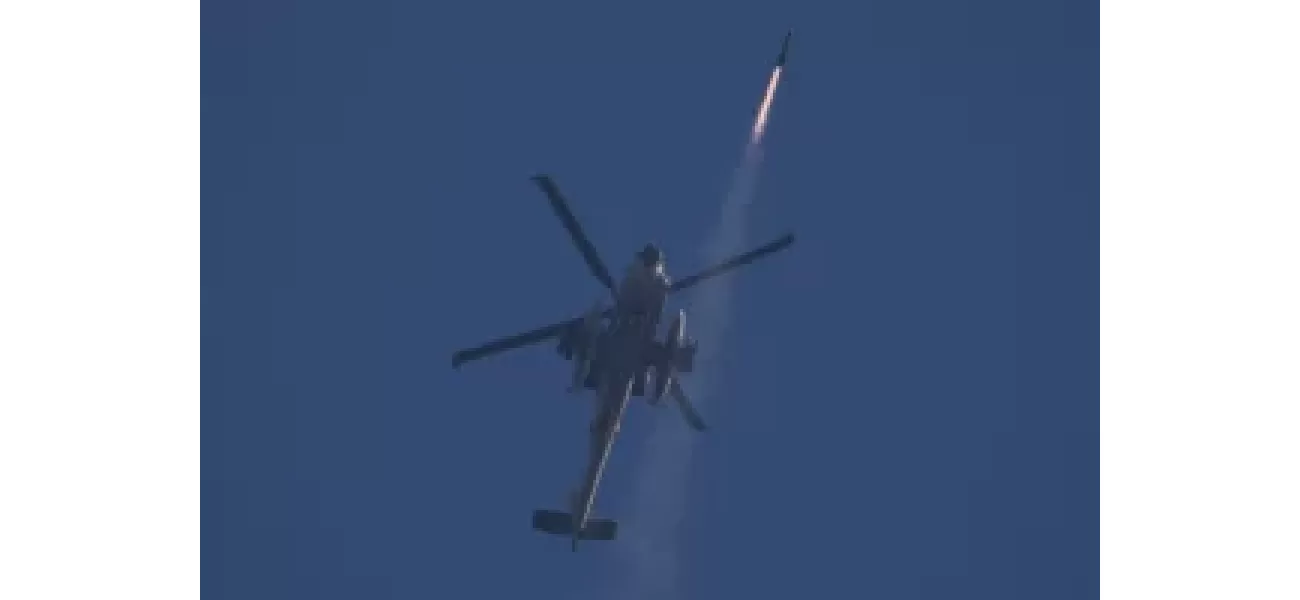Israeli airstrikes shake southern areas of Beirut, halt main entry point to Syria
Israel launched more airstrikes in Beirut, causing chaos and cutting off a crucial border crossing for those fleeing the conflict with Hezbollah.
October 5th 2024.

On Friday, the city of Beirut was once again hit by a series of aggressive airstrikes carried out by Israel. These strikes targeted the suburbs of Beirut and also resulted in the closure of the main border crossing between Lebanon and Syria. This caused major disruptions for tens of thousands of people who were trying to flee the ongoing bombardment of the Hezbollah militant group by Israel.
The airstrikes that took place overnight in Beirut's southern suburbs were so powerful that they sent massive plumes of smoke and flames into the sky, while also causing buildings in the Lebanese capital to shake. The Dahiyeh neighborhood was hit particularly hard, with one building being completely leveled and several cars being burned out. The Israeli military stated that they had targeted Hezbollah's central intelligence headquarters around midnight, but did not specify who their intended target was or if any militants were killed in the strike. They did, however, claim to have killed 100 Hezbollah fighters in the last 24 hours.
According to Lebanon's state-run National News Agency, there were more than 10 consecutive airstrikes in the area. This adds to the already devastating toll of the conflict, with over 1,400 Lebanese, including both Hezbollah fighters and civilians, having been killed and 1.2 million people being displaced from their homes since Israel escalated their attacks in late September. The situation has only been exacerbated by Hezbollah launching around 100 rockets into Israel on Friday.
The Israeli military also announced that one of their strikes in Beirut the day before had killed Mohammed Rashid Skafi, the head of Hezbollah's communications division. In a statement, they described him as a "senior Hezbollah terrorist" who had been in charge of the communications unit since 2000 and had close ties to high-ranking Hezbollah officials. This strike, which took place along the Lebanon-Syria border, led to the closure of a road near the Masnaa Border Crossing for the first time since the conflict between Israel and Hezbollah began almost a year ago.
Israel claimed that they targeted the crossing because it was being used by Hezbollah to transport military equipment from Iran and other allies into Lebanon. They stated that their fighter jets had struck a tunnel that was being used for this purpose. It is believed that much of Hezbollah's weaponry comes from Iran, their main supporter. This attack resulted in two huge craters on either side of the road, forcing people to leave their cars and cross on foot, carrying their belongings with them. More than 250,000 Syrians and 82,000 Lebanese have fled across the border into Syria during the recent escalation, and although there are several crossings between the two countries, most remain open.
Israel has been carrying out ground operations in Lebanon since Tuesday, with their forces engaging in clashes with Hezbollah militants along the border. Their main objective is to put an end to Hezbollah's attacks into northern Israel, which have been ongoing for almost a year and have forced thousands of people to leave their homes on both sides of the border. However, this has not come without consequences, as Israeli strikes have killed key members of Hezbollah, including their longtime leader Hassan Nasrallah.
On Thursday, Israel warned people living in southern Lebanon, including areas outside of the UN-declared buffer zone, to evacuate due to the ongoing conflict. Lieutenant Colonel Nadav Shoshani, an Israeli military spokesperson, stated on Friday that their ground operations are limited and aimed at eliminating Hezbollah militants and making the border safe for northern residents of Israel to return home. He added that their first priority is to ensure that Hezbollah is not present in the area, and then they will focus on preventing them from returning.
However, the military has reported that nine Israeli soldiers have been killed in close combat in the region, which is heavily armed with explosives. In addition, two more soldiers were killed and two were severely injured in a drone attack in northern Israel. The Israeli military officials have also stated that an Iraqi umbrella group of Iranian-backed militias, calling themselves the Islamic Resistance in Iraq, carried out three drone strikes on Friday in northern Israel. While this group has regularly claimed responsibility for launching drone attacks on Israel, they rarely cause any significant damage.
In Tehran, Iranian Foreign Minister Abbas Araghchi, who was visiting Beirut to meet with Lebanese officials, warned that if Israel attacks Iran, they will retaliate with even greater force than they did this week when they launched over 180 missiles into Israel in response to Israeli strikes on Hezbollah. This, along with the ongoing missile barrage and other escalating attacks, has raised fears of a potential region-wide war. Ayatollah Ali Khamenei, Supreme Leader of Iran, praised the country's missile strikes on Israel during his Friday prayer speech in Tehran and stated that they are prepared to launch more if necessary.
The conflict between Israel and Hezbollah started in 2023, after Hamas attacked southern Israel and killed 1,200 people while taking 250 others hostage. Since then, Israel's retaliation in Gaza has resulted in the deaths of over 41,000 Palestinians, with more than half of them being women and children, according to local health officials. A recent assessment conducted by the UN children's agency, UNICEF, and other humanitarian organizations found that at least 87% of school buildings in Gaza have been directly hit or damaged during Israel's offensive.
Meanwhile, in the occupied West Bank, Israel carried out their deadliest strike since the start of the conflict in Gaza, targeting a cafe in the Tulkarem refugee camp. According to the Palestinian Health Ministry, at least 18 people were killed, including a family of four, including two children. The Israeli military claimed that several Hamas militants were also killed in this strike, including the leader of the group in the camp. The military also reported that two rockets were fired from Gaza into Israeli territory on Friday, with one being intercepted by Israel's Iron Dome missile defense system and the other landing in an open area near a kibbutz on the border.
The airstrikes that took place overnight in Beirut's southern suburbs were so powerful that they sent massive plumes of smoke and flames into the sky, while also causing buildings in the Lebanese capital to shake. The Dahiyeh neighborhood was hit particularly hard, with one building being completely leveled and several cars being burned out. The Israeli military stated that they had targeted Hezbollah's central intelligence headquarters around midnight, but did not specify who their intended target was or if any militants were killed in the strike. They did, however, claim to have killed 100 Hezbollah fighters in the last 24 hours.
According to Lebanon's state-run National News Agency, there were more than 10 consecutive airstrikes in the area. This adds to the already devastating toll of the conflict, with over 1,400 Lebanese, including both Hezbollah fighters and civilians, having been killed and 1.2 million people being displaced from their homes since Israel escalated their attacks in late September. The situation has only been exacerbated by Hezbollah launching around 100 rockets into Israel on Friday.
The Israeli military also announced that one of their strikes in Beirut the day before had killed Mohammed Rashid Skafi, the head of Hezbollah's communications division. In a statement, they described him as a "senior Hezbollah terrorist" who had been in charge of the communications unit since 2000 and had close ties to high-ranking Hezbollah officials. This strike, which took place along the Lebanon-Syria border, led to the closure of a road near the Masnaa Border Crossing for the first time since the conflict between Israel and Hezbollah began almost a year ago.
Israel claimed that they targeted the crossing because it was being used by Hezbollah to transport military equipment from Iran and other allies into Lebanon. They stated that their fighter jets had struck a tunnel that was being used for this purpose. It is believed that much of Hezbollah's weaponry comes from Iran, their main supporter. This attack resulted in two huge craters on either side of the road, forcing people to leave their cars and cross on foot, carrying their belongings with them. More than 250,000 Syrians and 82,000 Lebanese have fled across the border into Syria during the recent escalation, and although there are several crossings between the two countries, most remain open.
Israel has been carrying out ground operations in Lebanon since Tuesday, with their forces engaging in clashes with Hezbollah militants along the border. Their main objective is to put an end to Hezbollah's attacks into northern Israel, which have been ongoing for almost a year and have forced thousands of people to leave their homes on both sides of the border. However, this has not come without consequences, as Israeli strikes have killed key members of Hezbollah, including their longtime leader Hassan Nasrallah.
On Thursday, Israel warned people living in southern Lebanon, including areas outside of the UN-declared buffer zone, to evacuate due to the ongoing conflict. Lieutenant Colonel Nadav Shoshani, an Israeli military spokesperson, stated on Friday that their ground operations are limited and aimed at eliminating Hezbollah militants and making the border safe for northern residents of Israel to return home. He added that their first priority is to ensure that Hezbollah is not present in the area, and then they will focus on preventing them from returning.
However, the military has reported that nine Israeli soldiers have been killed in close combat in the region, which is heavily armed with explosives. In addition, two more soldiers were killed and two were severely injured in a drone attack in northern Israel. The Israeli military officials have also stated that an Iraqi umbrella group of Iranian-backed militias, calling themselves the Islamic Resistance in Iraq, carried out three drone strikes on Friday in northern Israel. While this group has regularly claimed responsibility for launching drone attacks on Israel, they rarely cause any significant damage.
In Tehran, Iranian Foreign Minister Abbas Araghchi, who was visiting Beirut to meet with Lebanese officials, warned that if Israel attacks Iran, they will retaliate with even greater force than they did this week when they launched over 180 missiles into Israel in response to Israeli strikes on Hezbollah. This, along with the ongoing missile barrage and other escalating attacks, has raised fears of a potential region-wide war. Ayatollah Ali Khamenei, Supreme Leader of Iran, praised the country's missile strikes on Israel during his Friday prayer speech in Tehran and stated that they are prepared to launch more if necessary.
The conflict between Israel and Hezbollah started in 2023, after Hamas attacked southern Israel and killed 1,200 people while taking 250 others hostage. Since then, Israel's retaliation in Gaza has resulted in the deaths of over 41,000 Palestinians, with more than half of them being women and children, according to local health officials. A recent assessment conducted by the UN children's agency, UNICEF, and other humanitarian organizations found that at least 87% of school buildings in Gaza have been directly hit or damaged during Israel's offensive.
Meanwhile, in the occupied West Bank, Israel carried out their deadliest strike since the start of the conflict in Gaza, targeting a cafe in the Tulkarem refugee camp. According to the Palestinian Health Ministry, at least 18 people were killed, including a family of four, including two children. The Israeli military claimed that several Hamas militants were also killed in this strike, including the leader of the group in the camp. The military also reported that two rockets were fired from Gaza into Israeli territory on Friday, with one being intercepted by Israel's Iron Dome missile defense system and the other landing in an open area near a kibbutz on the border.
[This article has been trending online recently and has been generated with AI. Your feed is customized.]
[Generative AI is experimental.]
0
0
Submit Comment





